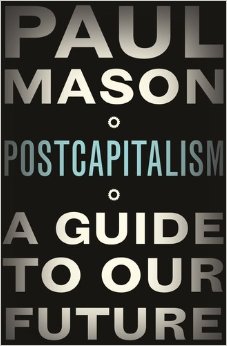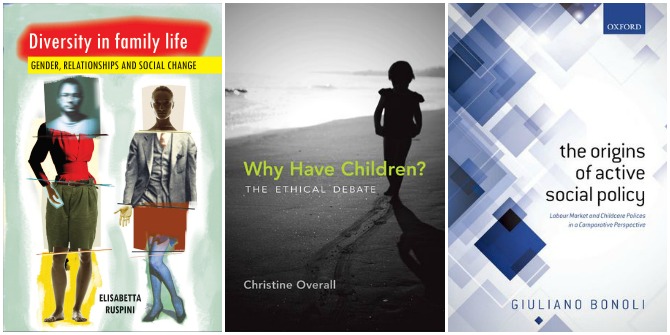In Postcapitalism: A Guide to Our Future, Paul Mason outlines the emergence of a new economic paradigm – postcapitalism – partly instigated by rapid developments in information technologies. For Mason, technological innovation fosters myriad changes that can challenge the traditional categories of classical economics to instead offer the possibility of forging a more socially just and sustainable economy. While the book presents a comprehensive and engaging insight into the complexity and failings of the current economic system, Simon Horton argues that Mason is overly optimistic in assuming that the information economy will necessarily engender a transition away from existing capitalist structures.
If you are interested in this review, you may also like to listen to a podcast of Paul Mason’s lecture at LSE, held on 18 November 2015.
Postcapitalism: A Guide to Our Future. Paul Mason. Allen Lane. 2015.
 The cyclical motion of neoliberal boom and bust is, according to Paul Mason’s most recent book, stalling. The expansion of non-market forces and the proliferation of an ‘information economy’ herald the advent of a new economic paradigm: postcapitalism. Straddling the border between political economy and social theory, Mason’s Postcapitalism: A Guide to Our Future aims to reveal the kernel of postcapitalism within the technological innovation of today’s society, and to construct a framework for the coming transition away from capitalist production.
The cyclical motion of neoliberal boom and bust is, according to Paul Mason’s most recent book, stalling. The expansion of non-market forces and the proliferation of an ‘information economy’ herald the advent of a new economic paradigm: postcapitalism. Straddling the border between political economy and social theory, Mason’s Postcapitalism: A Guide to Our Future aims to reveal the kernel of postcapitalism within the technological innovation of today’s society, and to construct a framework for the coming transition away from capitalist production.
That kernel, on Mason’s analysis, is to be found in the proliferation of information. What is unique about information is that it is – at least hypothetically – abundant. In economic terms, it is ‘non-rival’: there is no limit to the number of times an mp3 file or a film is copied, an e-book distributed or a string of programming code replicated. This, Mason argues, has significant consequences for accepted economic method. For one thing, information begins to corrode ‘the normal operation of the price mechanism’, hitherto dependent on a system of supply and demand that presupposes scarcity. iTunes, for example, has an infinite supply of every song it offers for sale. Scarcity in this instance is enforced only by intellectual property law and the string of Digital Rights Management (DRM) protection coded into every song purchased from the store. The inordinate profits made for the Apple corporation by its iTunes store are therefore the result of artificially enforced scarcity. Tech companies become gatekeepers to data which might otherwise be distributed arbitrarily.
In an economy dependent upon information, Mason continues, the fundamental categories of classical economics – those of land, labour and capital – collapse. Value can be created independently not only of raw material, but also of the labour hitherto required to transform it into a saleable commodity. The rise of Open Source software is a further blow to the basic tenements of global capitalism for it prefigures non-market forms of collaboration, exchange and ownership by detaching products from the profit motive, instilling them instead with what Mason calls a ‘moral interest’. By exploiting the networks made available by the internet and telecommunications more generally, humans can now engage in constructive, apparently social labour across distant geographies, and they can do so as an appendage to their workplace activities. Mason cites the enthusiast who edits a Wikipedia entry in their spare time and the coders who contribute to the endless revisions of the Open Source operating system, Linux. In each case, he argues, a socially expedient tool is created outside of normal market mechanisms through apparently horizontal and ‘unmanaged production’.
 Image Credit: eGuidry
Image Credit: eGuidry
Throughout Postcapitalism, Mason goes to lengths to show how these new modes of production and the liberation of hitherto protected information will contribute to the gradual adoption of a new economic structure, one beyond capitalism. But this transition is not so much argued for as it is assumed. The possibility of capitalism adapting in order to accommodate its new economic premises is briefly considered but dismissed quickly, on account of the threat of climate change, an ageing population in the Global North and a global debt crisis which makes its continued existence – to Mason – inconceivable. Capitalism is indeed resilient, but it cannot survive these truly existential threats. What it is that prevents the resurgence of an information-based capitalism, or indeed the embryonic growth of an even more brutal form of governance, is unclear. Mason seems complacent in his belief that postcapitalism of the sort he envisions will win out.
Furthermore, we have serious reason to question whether an information economy represents a severe aberration in the fabric of neoliberal capitalism. Mason is not at all mistaken when he denotes information goods as ‘non-rival’, but the question still remains as to whether that profligate abundance is allowed to traverse the fissure between private and public ownership. For the fact is that capitalism has always conspired to create scarcity where there exists material abundance. Mason is insistent that the basic tenets of neoliberal capitalism are incompatible with an economy based on information: something plentiful and replicable for zero cost. And yet roughly two hundred years of capitalism have shown the very opposite to be true. Thomas Carlyle, writing over 150 years ago, lamented the ills of overproduction when he stated: ‘Too many shirts? Well, that is a novelty, in this intemperate Earth, with its nine-hundred millions of bare backs!’
A similar point is made nowadays – in plainer language – by the World Food Programme (WFP) reports that claim that there is enough food ‘in the world today for everyone to have the nourishment necessary for a healthy and productive life’. Abundance has time and again proven itself entirely compatible with capitalism, and so a far more productive and prescient question is how one might go about dismantling the abstract property arrangements which allow for such unequal distribution of already abundant goods, and how – if abundance is presupposed – we might aid the transition to a society in which its effects are felt materially by all.
Furthermore, Mason’s fervent optimism for technological innovation makes him reluctant to spell out the consequences of a postcapitalist society for the inhabitants of the Global South. The growing populations that inhabit the regions of South America, Southeast Asia and Africa – historically prey to imperialist wealth-stripping and governance, and the providers of off-shore production aimed at enabling the affluent lifestyles of the Global North – are almost entirely without mention in Mason’s analysis. There is no word on how infrastructure allowing for a transition to a ‘networked, postcapitalist society’ will be constructed in these places; no indication as to whether a cobalt miner in the war-torn Democratic Republic of Congo will benefit from a collaborative, information-based economy. Indeed, the kind of networked, highly-educated existence that Mason ascribes to his postcapitalist subject is one attainable only by those whose society provides a certain standard of schooling provision and infrastructure. In a world imbalanced by asset-stripping and imposed destitution, it is entirely unclear just how the redistributive process, which Mason claims a postcapitalist society will produce, operates.
Overall, Mason remains considered when discussing the failings of the current system: one systemically reliant upon gross inequality with its proclivities toward economic crises, the costs of which are invariably suffered by the poor. His navigation of the complex arrangement of the banking systems, states, foreign debt and labour that serves to animate the world economy is both readable and engaging. It is when he comes to theorise about the ostensive subject of his book – the future – that Mason begins to collapse into an uncritical optimism. For to recognise technology’s capacity to ‘set us free’ is one thing, but equally prescient is the need to consider the reverse side of that equation: the possibility that technology might be turned back against the populace and used to support an otherwise ailing capitalism.
Simon Horton recently completed a Masters degree in Continental Philosophy at Warwick University. Before this, he graduated from the University of Hull with a BA in Politics and Philosophy. His interests include political theory, the philosophy of history and literature.
Note: This review gives the views of the author, and not the position of the LSE Review of Books blog, or of the London School of Economics.








6 Comments